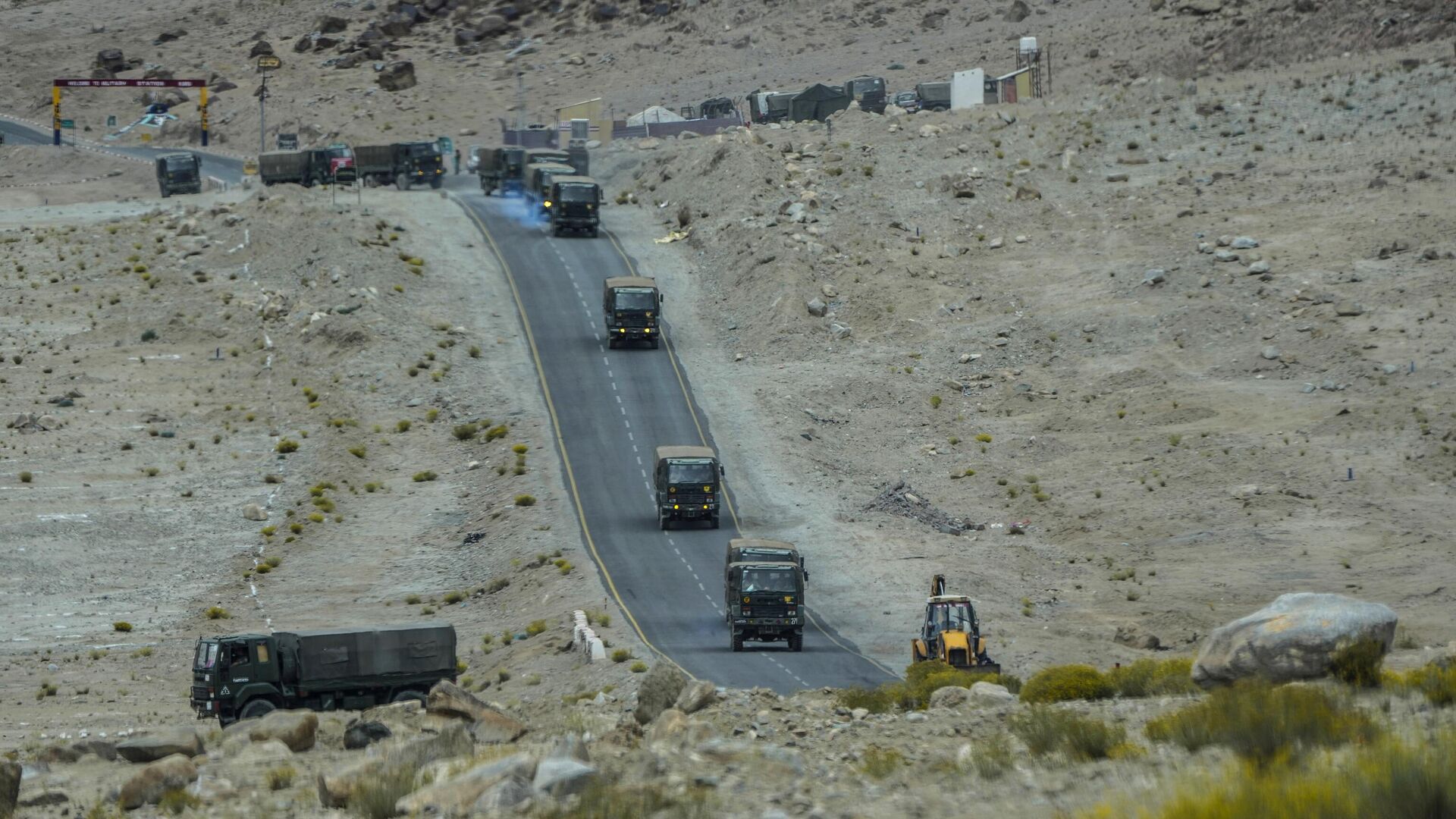https://sputniknews.in/20240327/terrorist-attacks-on-chinese-nationals-in-pakistan-raise-concerns-for-cpec-security-6962578.html
Terrorist Attacks on Chinese Nationals in Pakistan Raise Concerns for CPEC Security
Terrorist Attacks on Chinese Nationals in Pakistan Raise Concerns for CPEC Security
Sputnik India
On Tuesday, there was another tragic incident in northwest province Khyber Pakhtunkhwa (KPK) Pakistan as a suicide bomber drove his explosive-laden car into a vehicle, resulting in the deaths of five Chinese nationals and their Pakistani driver, according to Geo news report.
2024-03-27T17:29+0530
2024-03-27T17:29+0530
2024-03-29T12:34+0530
taliban
tehreek-e-taliban pakistan (ttp)
khyber pakhtunkhwa
pakistan
china-pakistan economic corridor (cpec)
terror outfits
terrorism
cross-border terrorism
counter-terrorism
terrorist attack
https://cdn1.img.sputniknews.in/img/07e6/0c/0d/65813_0:160:3073:1888_1920x0_80_0_0_4e01b1ecc87b8128e29e22db1a4825c8.jpg
The incident took place in Shangla, a district located in the Khyber Pakhtunkhwa province, as reported by local police Chief Bakhat Zahir. He stated that the five individuals who lost their lives were construction workers and engineers en route to the Dasu Dam, Pakistan's largest hydropower project.Attacks targeting Chinese nationals and law enforcement personnel, spanning from Balochistan to KPK province, have marred China-Pakistan Economic Corridor (CPEC) related activities. Local terrorist groups have issued threats against the CPEC, and within a week, three major attacks have occurred in areas connected to the project, including Gwadar city on Pakistan’s forces and Pakistan's second largest naval base, Turbat Naval Air Base.While the Balochistan Liberation Army (BLA), particularly the Majeed Brigade, has claimed responsibility for the attacks in Gwadar city and on the Turbat naval bases, the recent attack on Chinese nationals in KPK's Bisham area remains unclaimed.Terrorism & Regional Tensions: Security Analysis of Recent Attacks in PakistanTo dig in deep, Sputnik News interviewed some of the geo-political analysts and experts to shed light on this emerging security issue in Pakistan.Moreover, in this matter, Salman Javed, Director General of the Pak-Afghan Youth Forum & Geo-political analyst, told Sputnik,"This was Pakistan's second largest attack on Chinese people since the August 2021 Dasu suicide bombing, which killed nine. CPEC project delays owing to infrastructure and power plant completion coincide with these violence episodes. Increased security concerns in Kashmir and Balochistan accentuate this decline."In the province of KPK, from a security analysis standpoint, the Tehreek-e-Taliban Pakistan* (TTP) has previously claimed responsibility for the majority of attacks in the northwest region. One notable incident is the Dasu bombing in 2021, which resulted in the loss of 13 lives, including Chinese engineers, in a bus bombing as per dawn news.He further added, "These internal discrepancies, along with institutional weaknesses and political instability, further complicate the security landscape. Moreover, these attacks are not isolated incidents but are perceived within a broader strategic context, coinciding with disruptions in regional connectivity and potentially serving the interests of external actors aiming to contain China or disrupt regional stability."He added, "Well, it is a very sensitive issue which has certain national, regional and international connections, consequences, conspiracies, proxies war and extended threat of war spreading in the region and ill will of global power brokers and enemies of trans-regional connectivity, socio-economic prosperity and humanity have also polled their energies and sources to destabilize Pakistan and derail mega project of the CPEC in the country."Recently, Islamabad conducted an airstrike on Afghan soil to target terrorist safe havens, prompting Afghan forces to retaliate by launching attacks on Pakistani border checkpoints, claiming that Pakistan violated their sovereignty.Taliban Condemns Attack on Chinese Workers: Calls for Regional UnityAccording to Geo News report, over the past week, the relationship between Pakistan and Afghanistan has been tense owing to terrorist activities originating from Afghan territories that affect Pakistan. Pakistan accuses the Afghan government of harboring militant groups, while the Afghan Taliban** deny responsibility, citing Pakistan's security failures.Despite the fluctuations in the relationship between the two countries, the Taliban Foreign Ministry expresses regret over the suicide bombing of a bus transporting Chinese workers and engineers in the Shangla district of Khyber Pakhtunkhwa.Similarly, the Chinese embassy in Pakistan has vehemently denounced the act of terrorism near the Dasu Hydropower Project in Khyber Pakhtunkhwa province. Furthermore, the Chinese Embassy and Consulates in Pakistan have conveyed heartfelt condolences to the victims from both countries and extended sincere sympathies to the families of the deceased.*terror outfit banned in Russia and other states**under UN sanctions
https://sputniknews.in/20240327/alleged-us-plot-to-remove-imran-khan-sparks-outcry-at-congressional-hearing-6961432.html
khyber pakhtunkhwa
pakistan
china-pakistan economic corridor (cpec)
china
Sputnik India
feedback.hindi@sputniknews.com
+74956456601
MIA „Rossiya Segodnya“
2024
Muhammad Sharif
https://cdn1.img.sputniknews.in/img/07e7/0b/05/5257054_0:0:443:444_100x100_80_0_0_b8bd2af32be62a6eecdb4a84c7fd978f.jpg
Muhammad Sharif
https://cdn1.img.sputniknews.in/img/07e7/0b/05/5257054_0:0:443:444_100x100_80_0_0_b8bd2af32be62a6eecdb4a84c7fd978f.jpg
News
en_IN
Sputnik India
feedback.hindi@sputniknews.com
+74956456601
MIA „Rossiya Segodnya“
Sputnik India
feedback.hindi@sputniknews.com
+74956456601
MIA „Rossiya Segodnya“
Muhammad Sharif
https://cdn1.img.sputniknews.in/img/07e7/0b/05/5257054_0:0:443:444_100x100_80_0_0_b8bd2af32be62a6eecdb4a84c7fd978f.jpg
taliban, tehreek-e-taliban pakistan (ttp), khyber pakhtunkhwa, pakistan, china-pakistan economic corridor (cpec), terror outfits, terrorism, cross-border terrorism, counter-terrorism, terrorist attack, china, trade corridor, the united nations (un)
taliban, tehreek-e-taliban pakistan (ttp), khyber pakhtunkhwa, pakistan, china-pakistan economic corridor (cpec), terror outfits, terrorism, cross-border terrorism, counter-terrorism, terrorist attack, china, trade corridor, the united nations (un)
Terrorist Attacks on Chinese Nationals in Pakistan Raise Concerns for CPEC Security
17:29 27.03.2024 (Updated: 12:34 29.03.2024) On Tuesday, there was another tragic incident in northwest province Khyber Pakhtunkhwa (KPK) Pakistan as a suicide bomber drove his explosive-laden car into a vehicle, resulting in the deaths of five Chinese nationals and their Pakistani driver, according to Geo news report.
The incident took place in Shangla, a district located in the Khyber Pakhtunkhwa province, as reported by local police Chief Bakhat Zahir. He stated that the five individuals who lost their lives were construction workers and engineers en route to the Dasu Dam, Pakistan's largest hydropower project.
Attacks targeting Chinese nationals and law enforcement personnel, spanning from
Balochistan to KPK province, have marred China-Pakistan Economic Corridor
(CPEC) related activities. Local terrorist groups have issued threats against the CPEC, and within a week,
three major attacks have occurred in areas connected to the project, including Gwadar city on Pakistan’s forces and Pakistan's second largest naval base, Turbat Naval Air Base.
While the Balochistan Liberation Army (BLA), particularly the Majeed Brigade, has claimed responsibility for the attacks in Gwadar city and on the Turbat naval bases, the recent attack on Chinese nationals in KPK's Bisham area remains unclaimed.
Terrorism & Regional Tensions: Security Analysis of Recent Attacks in Pakistan
To dig in deep, Sputnik News interviewed some of the geo-political analysts and experts to shed light on this emerging security issue in Pakistan.
"Terrorist attacks against Chinese nationals have become commonplace in Pakistan since the inception of the China-Pakistan Economic Corridor (CPEC). Chinese labour and projects are not adequately protected due to complicated geopolitical and socioeconomic factors. Islamabad and Beijing have met multiple times, but no meaningful security arrangement has been implemented," Dr. Mehmood Ul Hassan Khan, an expert, Executive Director at the Center for South Asia & International Studies (CSAIS) told Sputnik.
Moreover, in this matter, Salman Javed, Director General of the Pak-Afghan Youth Forum & Geo-political analyst, told Sputnik,"This was Pakistan's second largest attack on Chinese people since the August 2021 Dasu suicide bombing, which killed nine. CPEC project delays owing to infrastructure and power plant completion coincide with these violence episodes. Increased security concerns in Kashmir and Balochistan accentuate this decline."
In the province of KPK, from a security analysis standpoint, the Tehreek-e-Taliban Pakistan* (
TTP) has previously claimed responsibility for the majority of attacks in the northwest region. One notable incident is the Dasu bombing in 2021, which resulted in the loss of 13 lives, including Chinese engineers, in a bus bombing as per dawn news.
"In the western region of Pakistan, the country shares porous borders with Iran and Afghanistan, providing ample opportunity for ethnonational and ethnoreligious elements such as Baloch separatists and the TTP-ISKP to utilise neighbouring countries as base camps for launching attacks on Pakistani soil. Past instances and recent patterns of RAW's involvement in transnational terrorism in Pakistan and other countries underscore the potential for Indian involvement," Salman Javed, a Geo-political analyst, told Sputnik.
He further added, "These internal discrepancies, along with institutional weaknesses and political instability, further complicate the security landscape. Moreover, these attacks are not isolated incidents but are perceived within a broader strategic context, coinciding with disruptions in regional connectivity and potentially serving the interests of external actors aiming to contain China or disrupt regional stability."
"Shehbaz Sharif, Pakistan's newly elected prime minister, has assured the Chinese government that all Chinese workers in Pakistan, especially those working on CPEC projects, will be fully protected. In order to investigate the latest terrorist assault in KPK, a joint investigation committee was established following a high-level security meeting that addressed both existing and future security concerns," Dr. Mehmood Ul Hassan Khan, an analysts further said that Possible next steps include developing a hybrid and joint security system, increasing the number of security officers deployed, and enhancing methods for sharing information.
He added, "Well, it is a very sensitive issue which has certain national, regional and international connections, consequences, conspiracies, proxies war and extended threat of war spreading in the region and ill will of global power brokers and enemies of trans-regional connectivity, socio-economic prosperity and humanity have also polled their energies and sources to destabilize Pakistan and derail mega project of the CPEC in the country."
Recently, Islamabad conducted an airstrike on Afghan soil to target terrorist safe havens, prompting Afghan forces to retaliate by launching attacks on Pakistani border checkpoints, claiming that Pakistan violated their sovereignty.
"These attacks are fueled by a combination of factors, including anti-Chinese sentiment, Baloch separation, and a decline in Pakistani security caused by the emergence of militant groups such as the TTP. Tackling these intricate difficulties will need China and Pakistan to work together on counter-terrorism," S.Javed said.
Taliban Condemns Attack on Chinese Workers: Calls for Regional Unity
According to Geo News report, over the past week, the relationship between Pakistan and
Afghanistan has been tense owing to terrorist activities originating from Afghan territories that affect Pakistan. Pakistan accuses the Afghan government of harboring militant groups, while the Afghan Taliban** deny responsibility, citing Pakistan's security failures.
Despite the fluctuations in the relationship between the two countries, the Taliban Foreign Ministry expresses regret over the suicide bombing of a bus transporting Chinese workers and engineers in the Shangla district of Khyber Pakhtunkhwa.
Similarly, the Chinese embassy in Pakistan has vehemently denounced the act of terrorism near the Dasu Hydropower Project in Khyber Pakhtunkhwa province. Furthermore, the Chinese Embassy and Consulates in Pakistan have conveyed heartfelt condolences to the victims from both countries and extended sincere sympathies to the families of the deceased.
"Last but not least, many regional countries and the international power brokers have been indulging in the Military Complex Theory to contain China which has become obvious now in term of delay of CPEC Phase-II because of increasing terrorism and terrorist activities in the country," Dr. Mehmood Ul Hassan Khan, an analysts, concluded.
*terror outfit banned in Russia and other states 


